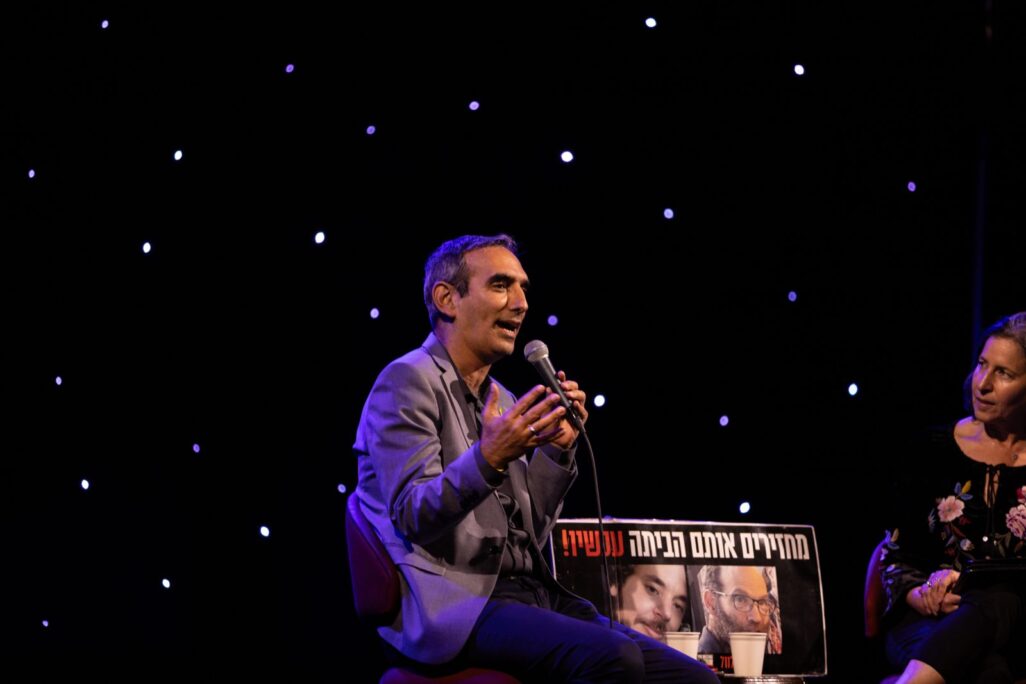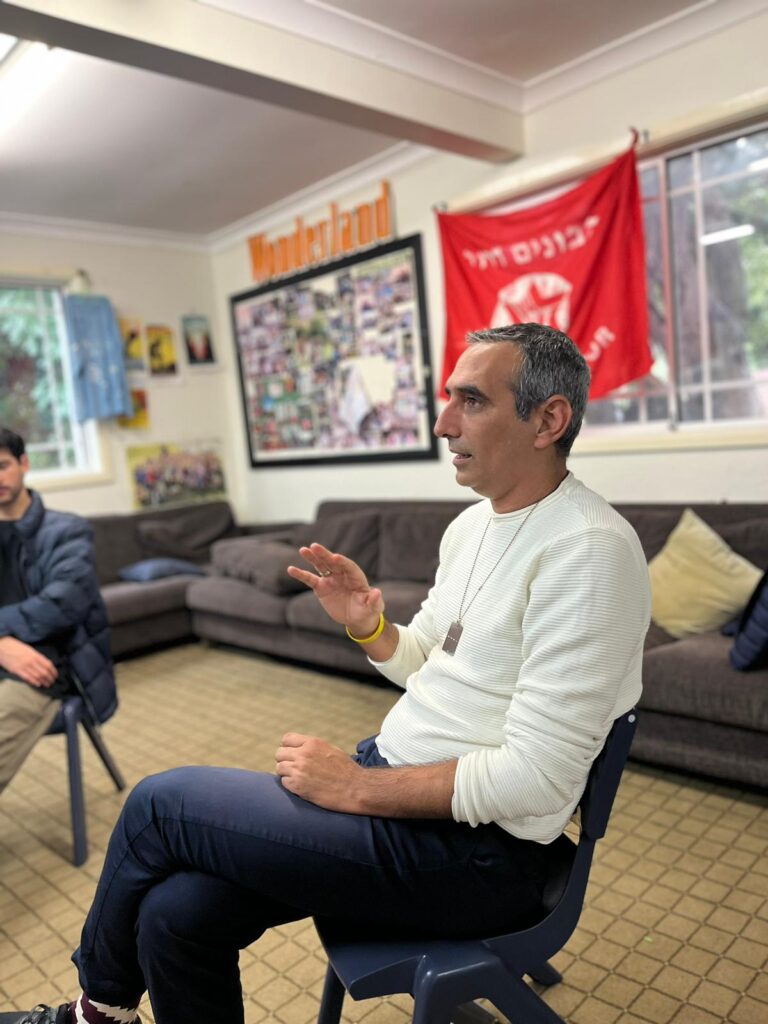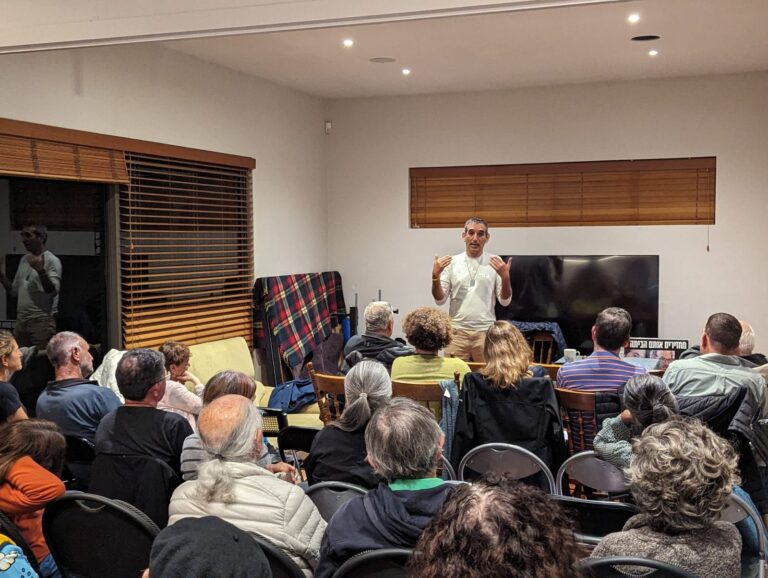
Australia’s 120,000-person Jewish community is known to be particularly pro-Israel among the Jewish communities of the world. Unlike in the United States, where many politically progressive Jews are anti-Zionist, the significant majority of progressive Jews in Australia are supportive of Israel.
This trend of widespread community support of Israel, even in progressive pockets, is being challenged by the current war between Israel and Hamas. Australian Jews who otherwise hold progressive political opinions feel torn in today’s black-and-white political environment, where the only two options seem to be uncritical support of Israel’s military actions, no matter what, or wholesale condemnation of Israel as a genocidal colonialist power.
Into this tense, politically claustrophobic environment entered Avi Dabush, the executive director of Rabbis for Human Rights and a survivor of the Oct. 7 attack on Kibbutz Nirim. Over the course of 10 days, Dabush met with Australian ministers, lawmakers, rabbis, donors, activists, judges, foundation managers, and educators, bringing with him a message of hope, peace, and dialogue.
Dabush’s background does not immediately suggest a peace activist. He was born and raised in Ashkelon in a religious Orthodox right-wing family from a Mizrahi background. After growing up in the Bnei Akiva youth movement and getting involved in politics, Dabush decided he wanted to use his voice to promote social justice and peace.
Since 2008, Dabush has lived in the Gaza envelope, devoting much of his work to bringing the left to Israel’s periphery. On Oct. 7, Dabush was at his home with his wife and her children in Kibbutz Nirim, one of the kibbutzim infiltrated by Hamas.
“The sirens started at 6:30 a.m., and the terrorists were inside Nirim within five minutes,” Dabush told Davar. “We went through very tough days. On Sunday afternoon the day after the attack, we evacuated to Eilat. Many things have changed. There is a lot of pain and a need to rebuild the family.”
Even after surviving the attack, Dabush’s commitment to peace remains strong. “It’s clear to me that Hamas cannot continue to be a partner and a leader of the government in Gaza. But my goals and values have not changed,” he said. “I am committed, more than ever, to peace, human rights, justice, and equality.”
Dabush was invited to tour the Australian Jewish community by the Australian wing of the New Israel Fund, a nonprofit organization that funds projects advancing liberal democracy in Israel.
“Perhaps at other times, I would have postponed the invitation due to the distance and time involved,” he said. “However, I felt it was right for me to gain perspective and distance from Israel for a while. For myself and also for the organization. I felt that I had a lot to say that no one else could express, and that I had a commitment to our partners across the sea, who have supported us in many ways since Oct. 7.”

He described the Australian Jewish community as “warm, open, honest people who really want to listen and help.”
“The Jewish community in Australia is considered conservative, but we encountered more progressive elements,” he said. “There is a lot of interest and willingness to help, and openness to hear a slightly different worldview. I felt that people really connected to the commitment to rediscover Israeli identity within this ongoing crisis, and a commitment to peace and human rights even amid this terrible war. Also, the need to open our eyes and not ignore the dire situation in Gaza and our responsibility toward it.”
When asked about the challenges facing the relationship between Israeli and diaspora Jews, Dabush pointed to the dialogical philosophy of Martin Buber as a method for bridging the gap.
“If I see Jews worldwide only as a financial source and reject any possibility of dialogue and their right to an opinion, I am not creating genuine relationships and I am essentially viewing them as objects,” he said. “On the other hand, communities must try to understand and listen more deeply to the various nuances in Israeli society and not be afraid to express their opinions. After all, there is no one way to assist Israel. I believe that just like family, there is now an obligation to respectfully critique the direction Israel is taking, because we are in deep crisis and danger.”

Dabush is clear that Jews in Israel and across the diaspora have a responsibility to speak out against unjust elements of the current war. But he also was forthright about the Palestinians’ responsibility to promote a peaceful alternative to Hamas for there to ever be a genuine solution.
“I emphasized this all along the way in Australia,” he said. “In open meetings, in Jewish schools, in synagogues, and also in meetings with members of parliament and the government. The Palestinian Authority was weakened by Israel but also itself failed to rise and be strong for Palestinians. We hear from our Palestinian partners how corrupt it is and how little regard they have for it. Hamas exploits Palestinians, and they need to reject its leadership. It’s very hard, but it must happen so that we can reach a place and agreements that will allow good lives for Israelis and Palestinians, side by side, for years to come.”
Ultimately, Dabush’s vision for Israel, which he hopes to bring not just to Australians but to Jews in Israel and across the world, is one of coexistence.
“There is no other way,” he said. “We must learn to live together. Ofra Haza, the famous Israeli singer, sang, ‘One destiny placed us here, in this land.’ In the end, peace is inevitable. The question is how much blood will be shed on the way there. I dream of two independent states with freedom of movement and cooperation. And from there, a Middle Eastern union that can stand against hostile forces like Iran but also fulfill the vision of Israel's contribution to the prosperity of the entire Middle East, as envisioned in the Declaration of Independence.”






